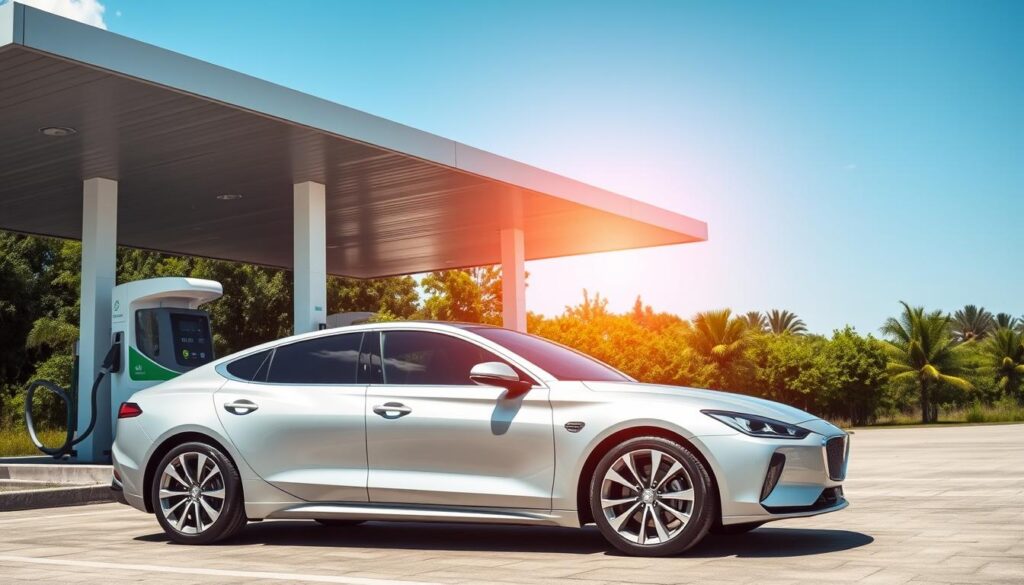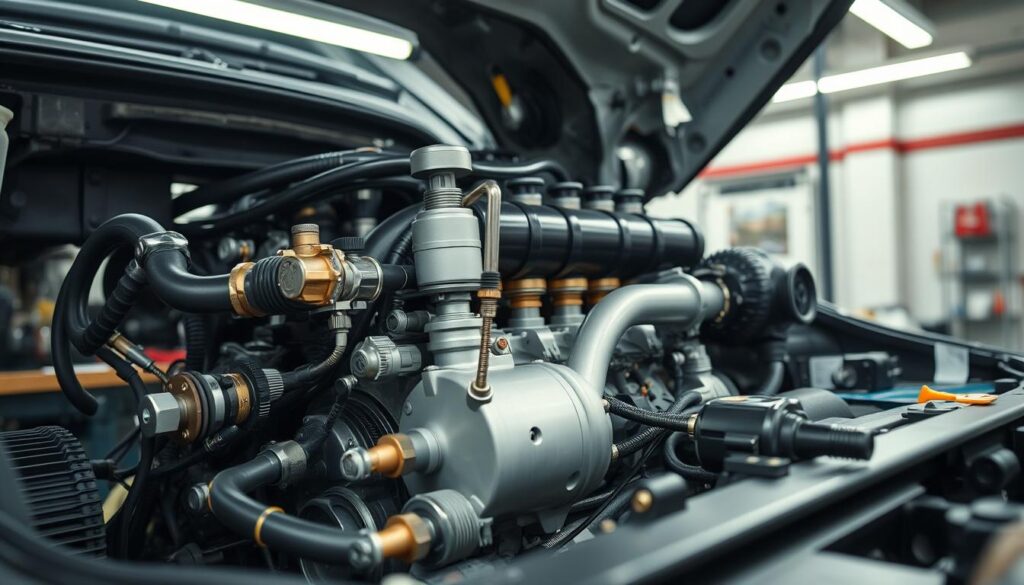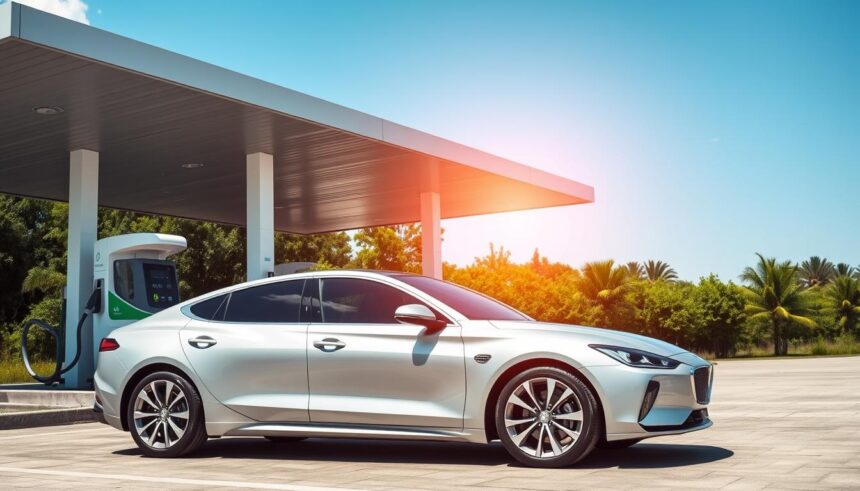I have always looked for ways to make my car better. Switching to a CNG car Mileage was a game-changer. My car now runs more efficiently, and I’m excited to share this with you.
In India, high fuel prices are a big issue. CNG cars offer a cost-effective solution. They are also better for the environment, reducing harmful emissions.

To get the best mileage from your CNG car, you need to pay attention. I’ve learned some valuable tips.
Key Takeaways
- CNG engines can provide up to twice the mileage of a liter of petrol in a vehicle.
- Regular maintenance of air filters and spark plugs is crucial for optimal CNG car performance.
- Maintaining proper tyre pressure and inspecting clutch and transmission components can significantly improve mileage.
- CNG cars have lower running and maintenance costs compared to petrol cars, making them a more cost effective choice in the long run.
- The availability of CNG refueling stations is growing, making it a more accessible fuel option for eco-conscious drivers.
Understanding CNG Car Mileage
Compressed Natural Gas (CNG) is becoming a top choice for cars in India. It burns cleaner than petrol or diesel, making it a great option for many. This is why more people and businesses are choosing CNG for their vehicles.
What is CNG and Why is it Gaining Popularity?
CNG is natural gas that’s been squeezed to a high pressure. This makes it lighter than air. It powers CNG cars, which are more fuel-efficient and cost less to run than petrol or diesel cars.
- CNG cars can go up to 25% further on the same fuel as petrol cars.
- They have similar engine life to petrol cars but are cleaner, which is better for the engine.
- While CNG cars cost more upfront, the savings on fuel can make up for it over time.
- They have less room in the trunk because CNG tanks take up more space than petrol tanks.
The big advantage of CNG is its lower fuel costs. This is a key reason why CNG cars are growing in popularity in India. They also produce fewer emissions, making them a favorite among those who care about the environment.
CNG cars are a game-changer in the Indian automotive market, offering a cost-effective and eco-friendly alternative to traditional fuel-powered vehicles.
cng car mileage: Tips for Improving Fuel Efficiency
To get the most out of your CNG car, follow simple maintenance tips. Keeping your car in top shape boosts its fuel efficiency. This way, you enjoy the benefits of CNG’s superior mileage.
Regularly Maintain Air Filter and Spark Plugs
A clean air filter is key for smooth airflow and the right air-fuel mix in your CNG car. Regular cleaning or replacement of the air filter prevents mileage drops due to airflow issues. Also, using quality spark plugs for CNG engines ensures complete fuel burn. This boosts your car’s mileage.
Check Tyre Pressure and Alignment
Correct tyre pressure greatly improves fuel efficiency. Experts suggest adding 2-5 PSI to the front tyres for better mileage. Also, regular alignment checks, every 5,000 km, reduce rolling resistance and enhance fuel efficiency.
Inspect Clutch and Transmission Components
Smooth operation of your vehicle’s clutch and transmission is vital for efficient power transfer. Regular checks and the right transmission fluid keep your CNG car running efficiently.
By following these tips, you can maximize your CNG car’s fuel efficiency. Enjoy exceptional performance on the road.

| Maintenance Tip | Impact on Fuel Efficiency |
|---|---|
| Maintaining correct tyre pressure | Up to 3% improvement |
| Proper engine and CNG kit servicing | Significant mileage enhancement |
| Avoiding aggressive driving | 7-14% fuel economy improvement |
| Using cruise control wisely | Up to 7% fuel economy boost |
Maintaining your CNG car’s air filter, spark plugs, tires, and transmission can unlock the true potential of its fuel efficiency.
Conclusion
To get the most out of a CNG car, you need regular care and smart driving. Keeping air filters, spark plugs, and tire pressure in check helps a lot. Also, checking the clutch and transmission can boost your car’s fuel efficiency.
Driving wisely and being aware of road conditions also plays a big role. This makes CNG cars a better choice for saving money and being kind to the environment in India.
The Maruti Wagon R CNG is a great example, offering 32.52 km per kg of CNG. This is way better than its petrol version’s 21.79 km per liter. CNG is cheaper than petrol in Delhi, making CNG cars a smart choice for saving money and reducing carbon footprint.
But, buying a CNG car costs more upfront. And, you might spend a bit more on maintenance because of the CNG kit.
Choosing a CNG car in India depends on what you value most. If you care about saving fuel, the environment, and money in the long run, CNG cars are worth considering. Even with the higher initial cost and some maintenance issues, CNG cars offer many benefits. They help make our transportation greener and more affordable.
FAQ
What is CNG and why is it becoming popular in India?
Compressed Natural Gas (CNG) is a clean fuel for cars in India. It’s lighter than air and burns cleaner than petrol or diesel. CNG cars run on natural gas instead of traditional fuels.
They are cheaper to run, more efficient, and good for the environment. This makes them popular in India. The big advantage is how much cheaper CNG is than petrol or diesel.
How can I get the best mileage from my CNG car?
To get the best mileage from a CNG car, follow some simple tips. Clean the air filter regularly. A dirty filter can mess up airflow and fuel mix, leading to less efficiency and more fuel use.
Use quality spark plugs that handle CNG’s high ignition temperature. This ensures complete fuel burning. Keep the tyres at the right pressure and check the vehicle’s alignment. This reduces rolling resistance and boosts fuel efficiency.
Also, check the clutch and transmission often. Use the right transmission fluid. This ensures engine power is efficiently sent to the wheels, improving mileage.
What are the key factors that affect CNG car mileage?
Several factors can affect a CNG car’s mileage. These include the air filter, spark plugs, tyre pressure, wheel alignment, and clutch and transmission condition. Keeping these in good shape improves fuel efficiency.
Driving style and road conditions also play a role. Being mindful of your driving and adapting to the road can help improve fuel efficiency.
